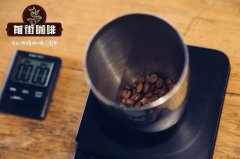The Origin of African Kenyan Coffee beans the flavor characteristics of Kenyan coffee beans

Professional coffee knowledge exchange more coffee bean information please follow the coffee workshop (Wechat official account cafe_style)
Qianjie-introduction to the history and flavor of Kenyan coffee
Kenya has a history of growing coffee beans for only a hundred years. In the 20th century, Kenya began to develop the coffee industry on a large scale under the leadership of British and German colonists. Today, Kenyan coffee production units are dominated by small plantations with an average area of only half an acre.
Although Kenya produces 49980 metric tons of coffee beans per year, far less than the top in the world, Kenyan coffee beans have many followers in the boutique coffee industry and are currently exported to developed countries in Europe and Asia. Buyers are world-class quality buyers.
Kenyan coffee is famous for its aromatic, full-bodied, fruity flavor and rich and perfect taste. It has a wonderful fruit flavor, tastes like BlackBerry and grapefruit, and is a favorite of many coffee gluttons. This coffee has an excellent medium purity, crisp and refreshing taste.
Why is it called the boutique of coffee industry?
Most of Kenya's coffee crops are grown in the fertile, loose, acidic volcanic red soil of the highlands north and east of Nairobi. There is plenty of light and good drainage, and the elevation is between 1400 and 2000 meters. Because the higher the altitude, the greater the temperature difference between day and night, the ripening cycle of Kenyan coffee is longer than that of low altitude, so it has higher density and rich flavor. Kenyan coffee, known as the "Cup of connoisseurs" (Connoisseurs' Cup), is famous for its rich aroma, vibrant acidity, full mellowness and elegant red wine flavor.
Because the ribs of the KONO filter cup are relatively short, it stops when it is less than half the height of the filter cup. The main purpose of this design is to ensure that in the process of dripping, the filter paper can be attached to the wall of the filter cup after absorbing water, so that the exhaust space of the filter cup is limited, the air flow is naturally limited, and the flow rate slows down. so that coffee powder is soaked for a large part of the time, which increases the water absorption time of coffee powder particles, thus making the extracted coffee more balanced as a whole. It is not easy to cause insufficient extraction.
Parameter & technique
Water temperature: 90 ℃; medium and fine grinding (BG 5R: pass rate of Chinese standard No. 20 sieve 58%); ratio of powder to water 1:15.
The amount of powder is 15 grams, steam for 30 seconds with 32 grams of water, segment water injection to 129 grams, and cut off water when the water level drops to 228 grams when the separate bed is about to be exposed. (steaming starts) extraction time is 2: 03 "
[flavor] there are sour notes of virgin fruit, lemon, grapefruit and berries, cream and chocolate in the middle, obvious sweetness of caramel and mellow overall taste.
In short: Qianjie is a coffee research hall, happy to share the knowledge about coffee with you, we share unreservedly just to make more friends fall in love with coffee, and there will be three low-discount coffee activities every month. The reason is that Qianjie wants to make more friends drink the best coffee at the lowest price, which has been Qianjie's tenet for 6 years!
END
Important Notice :
前街咖啡 FrontStreet Coffee has moved to new addredd:
FrontStreet Coffee Address: 315,Donghua East Road,GuangZhou
Tel:020 38364473
- Prev

How about Kenyan Coffee in Africa A brief introduction to the story of Kenyan Coffee plus Chasha processing Plant
Professional coffee knowledge exchange more coffee bean information please follow the coffee workshop (Wechat official account cafe_style) front street-Kenya coffee Jiachasha processing plant brief introduction most coffee beans are uniformly graded by the Kenya Coffee Agency and then sold on the auction floor, the public auction system can be traced back to 1934, the auction method adopts the agent system, Kenya has 50 holders
- Next

Characteristics of washing treatment of Kenyan coffee beans flavor and taste of Kenyan coffee beans
Professional coffee knowledge exchange more coffee bean information please follow the coffee workshop (Wechat official account cafe_style) front street-Kenyan coffee flavor, exquisite treatment sharing front street today to tell you the coffee story of Kenya! Kenya is geographically close to Ethiopia and, like Ethiopia, is also considered to be one of the places of human origin (about 2.5 million have been unearthed in the country
Related
- Beginners will see the "Coffee pull flower" guide!
- What is the difference between ice blog purified milk and ordinary milk coffee?
- Why is the Philippines the largest producer of crops in Liberia?
- For coffee extraction, should the fine powder be retained?
- How does extracted espresso fill pressed powder? How much strength does it take to press the powder?
- How to make jasmine cold extract coffee? Is the jasmine + latte good?
- Will this little toy really make the coffee taste better? How does Lily Drip affect coffee extraction?
- Will the action of slapping the filter cup also affect coffee extraction?
- What's the difference between powder-to-water ratio and powder-to-liquid ratio?
- What is the Ethiopian local species? What does it have to do with Heirloom native species?

